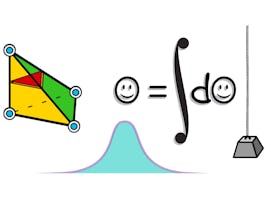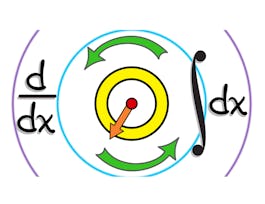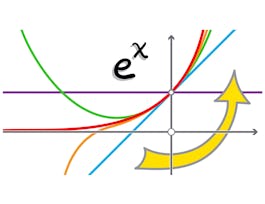Calculus is one of the grandest achievements of human thought, explaining everything from planetary orbits to the optimal size of a city to the periodicity of a heartbeat. This brisk course covers the core ideas of single-variable Calculus with emphases on conceptual understanding and applications. The course is ideal for students beginning in the engineering, physical, and social sciences. Distinguishing features of the course include: 1) the introduction and use of Taylor series and approximations from the beginning; 2) a novel synthesis of discrete and continuous forms of Calculus; 3) an emphasis on the conceptual over the computational; and 4) a clear, dynamic, unified approach.


Calculus: Single Variable Part 2 - Differentiation
Taught in English
45,090 already enrolled
(918 reviews)
Skills you'll gain
Details to know
15 quizzes
See how employees at top companies are mastering in-demand skills

There are 3 modules in this course
Think derivatives mean "slopes"? Not anymore... In this module, we will reconsider what a derivative is and means in terms of the asymptotic (or big-O) notation from the previous chapter. This will give us a new language for describing and understanding rates of change and the rules that govern them.
What's included
3 videos2 readings4 quizzes
Why exactly are derivatives so central to calculus? In part, it is because they are so ubiquitously useful! In this module, we will recall a few core applications of derivatives. In so doing, we'll see exactly how having an understanding of the asymptotics assists in building applications of the derivative.
What's included
5 videos6 quizzes
There is much more to derivatives than simply their computation and applications. So much of how they arise is calculus is in the mysterious guise of *differentials*. These arise from implicit differentiation, which in turn reveals a deeper level of understanding of what differentiation means.
What's included
3 videos1 reading5 quizzes
Instructor

Offered by
Recommended if you're interested in Math and Logic

University of Pennsylvania

University of Pennsylvania

University of Pennsylvania

Coursera Project Network
Why people choose Coursera for their career




Learner reviews
Showing 3 of 918
918 reviews
- 5 stars
84%
- 4 stars
13.05%
- 3 stars
1.74%
- 2 stars
0.76%
- 1 star
0.43%

Open new doors with Coursera Plus
Unlimited access to 7,000+ world-class courses, hands-on projects, and job-ready certificate programs - all included in your subscription
Advance your career with an online degree
Earn a degree from world-class universities - 100% online
Join over 3,400 global companies that choose Coursera for Business
Upskill your employees to excel in the digital economy
Frequently asked questions
Access to lectures and assignments depends on your type of enrollment. If you take a course in audit mode, you will be able to see most course materials for free. To access graded assignments and to earn a Certificate, you will need to purchase the Certificate experience, during or after your audit. If you don't see the audit option:
The course may not offer an audit option. You can try a Free Trial instead, or apply for Financial Aid.
The course may offer 'Full Course, No Certificate' instead. This option lets you see all course materials, submit required assessments, and get a final grade. This also means that you will not be able to purchase a Certificate experience.

